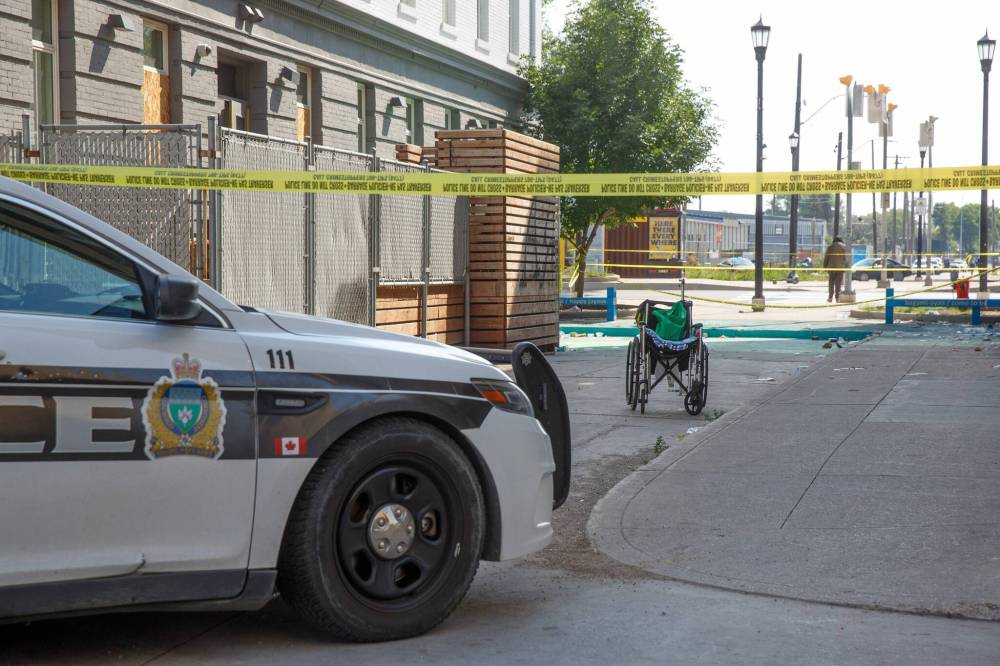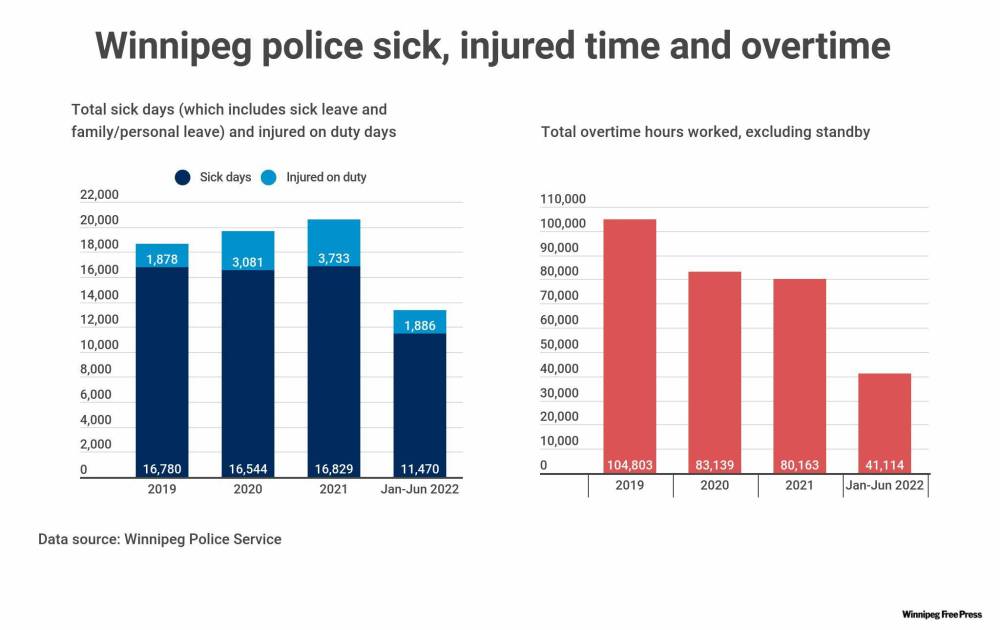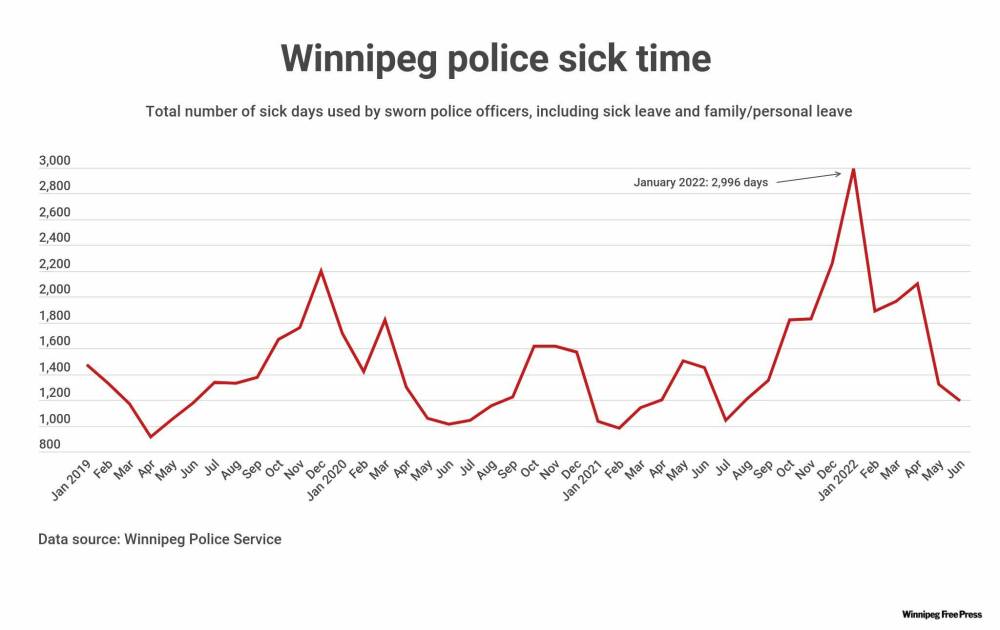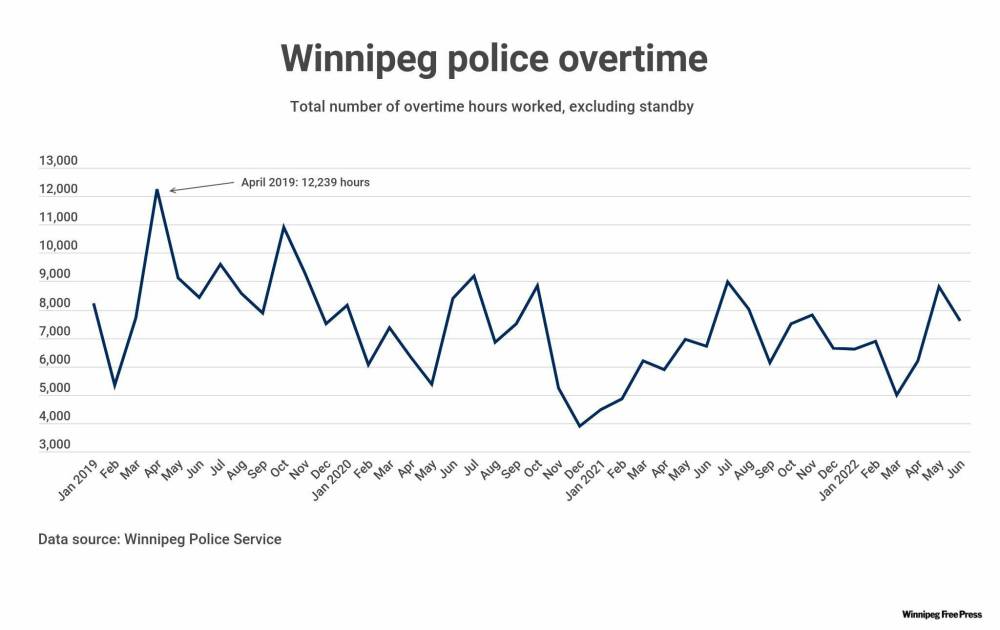Sick leave up for Winnipeg cops
Advertisement
Read this article for free:
or
Already have an account? Log in here »
To continue reading, please subscribe:
Monthly Digital Subscription
$0 for the first 4 weeks*
- Enjoy unlimited reading on winnipegfreepress.com
- Read the E-Edition, our digital replica newspaper
- Access News Break, our award-winning app
- Play interactive puzzles
*No charge for 4 weeks then price increases to the regular rate of $19.00 plus GST every four weeks. Offer available to new and qualified returning subscribers only. Cancel any time.
Monthly Digital Subscription
$4.75/week*
- Enjoy unlimited reading on winnipegfreepress.com
- Read the E-Edition, our digital replica newspaper
- Access News Break, our award-winning app
- Play interactive puzzles
*Billed as $19 plus GST every four weeks. Cancel any time.
To continue reading, please subscribe:
Add Free Press access to your Brandon Sun subscription for only an additional
$1 for the first 4 weeks*
*Your next subscription payment will increase by $1.00 and you will be charged $16.99 plus GST for four weeks. After four weeks, your payment will increase to $23.99 plus GST every four weeks.
Read unlimited articles for free today:
or
Already have an account? Log in here »
Hey there, time traveller!
This article was published 31/08/2022 (1196 days ago), so information in it may no longer be current.
The Winnipeg Police Service appears on track for a surge in officer sick days this year, while injury leave is also on the rise.
Officers claimed 11,470 sick days between January and June, compared to 16,829 for all of 2021. Aside from that increase, sick day numbers did not fluctuate much per year between 2019 and 2021, according to data obtained through a freedom of information request.
At first glance, it may seem the police service avoided the steeper surge in staff absences experienced by other civic emergency departments through much of the COVID-19 pandemic. For example, Winnipeg firefighters and paramedics took 16,695 sick days during the first five months of 2022 (including long-term leaves and denied Workers Compensation Board of Manitoba claims), up from 10,535 throughout all of 2021.

But the union that represents city police officers says they suffer from a staffing crunch the numbers don’t fully explain.
“We hear that sick time is up because of the stressors that are occurring. People can’t get time off, so people are using sick time to get the break that (they) need,” said Moe Sabourin, president of the Winnipeg Police Association.
The department counts COVID-19-related illness and isolation days that are caused by a workplace exposure as days lost due to being “injured on duty,” not sick days, Sabourin noted. The union supports that because it preserves sick time for other reasons, he said.
(Both sick days and “injured on duty” days reflect a variety of illnesses and injuries, not just those related to the pandemic.)
Police confirmed the data are tracked that way, with 1,878 days lost due to officers being “injured on duty” in 2019, followed by 3,081 days in 2020, 3,733 days in 2021, and 1,886 days between January and June 2022.
High call volumes are now also leading more officers to begin rejecting overtime requests, Sabourin said.
“People can’t get time off, it is extremely busy, our general patrol is extremely short, our (communications) centre is running below minimum (staffing level)… They’re just overworked. The level of violence (police respond to) is unprecedented and people are looking for some sort of relief from the strain,” he said.
This year’s sick data include a spike in sick days for January, when 2,996 days were lost due to illness, the most of any month since the start of 2019. On Jan. 5, WPS Chief Danny Smyth declared a rare “state of emergency” for his department, after 172 employees booked off work due to the coronavirus, fuelling a severe staff shortage.
Police overtime hours have dropped, though, with 104,803 logged in 2019, 83,139 in 2020, 80,163 in 2021, and 41,114 in 2022 (up to the end of June).
Between January 2019 and June 2022, the highest monthly overtime total occurred in April 2019, with 12,239 extra hours worked. The city hosted Winnipeg Jets “Whiteout” NHL playoff parties that month, where police provided extensive security, Sabourin noted.
The union leader said efforts to control police overtime spending may have recently helped prevent a surge in extra hours, but he also believes these measures risk lengthening wait times for police response.
“We’ve heard of many long delays… People waiting for three or four days for our members to get there after a break-in, after people were actually in the house at the same time,” he said.
A Winnipeg police spokesman said no one was available for an interview to discuss the data or to provide a written statement to answer questions about it.
The increase in sick time at the start of this year, as well as the reports of increased stress for officers, are somewhat expected, said Coun. Markus Chambers, chairman of the Winnipeg Police Board.
“In the face of a pandemic, I wouldn’t be surprised at all to see those numbers… Stress (is) part of it, too. So far in 2022, we’re seeing a high number of homicides that have taken place in our city… The stress of dealing with all those calls, that has an impact on officers’ well-being,” said Chambers.
He believes the department was able to control overtime hours this year in part because the state of emergency declared in January allowed officers to be redeployed to different roles. He said it helped minimize the amount of overtime needed to address staff shortages.
Chambers also noted COVID-19 lockdowns also kept more people at home during parts of the pandemic, sometimes resulting in fewer incidents that required a police response.
joyanne.pursaga@freepress.mb.ca
Twitter: @joyanne_pursaga

Born and raised in Winnipeg, Joyanne loves to tell the stories of this city, especially when politics is involved. Joyanne became the city hall reporter for the Winnipeg Free Press in early 2020.
Our newsroom depends on a growing audience of readers to power our journalism. If you are not a paid reader, please consider becoming a subscriber.
Our newsroom depends on its audience of readers to power our journalism. Thank you for your support.





